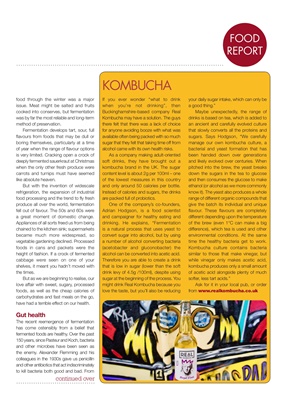
KITLIVING
FOOD
REPORT
food through the winter was a major
issue. Meat might be salted and fruits
cooked into conserves, but fermentation
was by far the most reliable and long-term
method of preservation.
Fermentation develops tart, sour, full
flavours from foods that may be dull or
boring themselves, particularly at a time
of year when the range of flavour options
is very limited. Cracking open a crock of
deeply fermented sauerkraut at Christmas
when the only other fresh produce were
carrots and turnips must have seemed
like absolute heaven.
But with the invention of widescale
refrigeration, the expansion of industrial
food processing and the trend to fly fresh
produce all over the world, fermentation
fell out of favour. The 50s and 60s were
a great moment of domestic change.
Appliances of all sorts freed us from being
chained to the kitchen sink; supermarkets
became much more widespread, so
vegetable gardening declined. Processed
foods in cans and packets were the
height of fashion. If a crock of fermented
cabbage were seen on one of your
shelves, it meant you hadn't moved with
the times.
But as we are beginning to realise, our
love affair with sweet, sugary, processed
foods, as well as the cheap calories of
carbohydrates and fast meals on the go,
have had a terrible effect on our health.
Gut health
The recent reemergence of fermentation
has come ostensibly from a belief that
fermented foods are healthy. Over the past
150 years, since Pasteur and Koch, bacteria
and other microbes have been seen as
the enemy. Alexander Flemming and his
colleagues in the 1930s gave us penicillin
and other antibiotics that act indiscriminately
to kill bacteria both good and bad. From
continued over
If you ever wonder "what to drink
when you're not drinking", then
Buckinghamshire-based company Real
Kombucha may have a solution. The guys
there felt that there was a lack of choice
for anyone avoiding booze with what was
available often being packed with so much
sugar that they felt that taking time off from
alcohol came with its own health risks.
As a company making adult-oriented
soft drinks, they have brought out a
kombucha brand in the UK. The sugar
content level is about 2g per 100ml - one
of the lowest measures in this country
and only around 50 calories per bottle.
Instead of calories and sugars, the drinks
are packed full of probiotics.
One of the company's co-founders,
Adrian Hodgson, is a food scientist
and campaigner for healthy eating and
drinking. He explains, "Fermentation
is a natural process that uses yeast to
convert sugar into alcohol, but by using
a number of alcohol converting bacteria
(acetobacter and gluconobacter) the
alcohol can be converted into acetic acid.
Therefore you are able to create a drink
that is low in sugar (lower than the soft
drink levy of 4.5g /100ml), despite using
sugar at the beginning of the process. You
might drink Real Kombucha because you
love the taste, but you'll also be reducing
KOMBUCHA
your daily sugar intake, which can only be
a good thing."
Maybe unexpectedly, the range of
drinks is based on tea, which is added to
an ancient and carefully evolved culture
that slowly converts all the proteins and
sugars. Says Hodgson, "We carefully
manage our own kombucha culture, a
bacterial and yeast formation that has
been handed down over generations
and likely evolved over centuries. When
pitched into the brew, the yeast breaks
down the sugars in the tea to glucose
and then consumes the glucose to make
ethanol (or alcohol as we more commonly
know it). The yeast also produces a whole
range of different organic compounds that
give the batch its individual and unique
flavour. These flavours are completely
different depending upon the temperature
of the brew (even 1°C can make a big
difference), which tea is used and other
environmental conditions. At the same
time the healthy bacteria get to work.
Kombucha culture contains bacteria
similar to those that make vinegar, but
while vinegar only makes acetic acid,
kombucha produces only a small amount
of acetic acid alongside plenty of much
softer, less tart acids."
Ask for it in your local pub, or order
from www.realkombucha.co.uk